
One person has passed away, and another has been hospitalized after contracting Legionnaires' disease during their stay at a New Hampshire resort.
Legionnaires' disease
Following a stay at the Mountain View Grand Resort and Spa in Whitefield, NH, one individual has passed away and another has been hospitalized after being diagnosed with Legionnaires’ disease.
The New Hampshire Department of Health and Human Services issued an alert on Friday, stating that two out-of-state residents had fallen ill. An investigation is ongoing to determine the potential sources of exposure for the individuals, one from Rhode Island and the other from Massachusetts, who stayed at the resort.
The resort stated on Facebook that the state could not determine where the infected individuals contracted the virus. They are collaborating with the New Hampshire Division of Public Health Services and New Hampshire Department of Environmental Services to investigate if the visitors were affected during their fall 2023 visit.
Mountain View emphasized its dedication to the well-being of all visitors and expressed their commitment to following strict health and safety protocols while awaiting test results to identify the potential source of the infection.
According to the U.S. Centers for Disease Control and Prevention, Legionnaires’ disease is a severe form of pneumonia caused by the Legionella bacteria.
Legionella bacteria are transmitted when individuals inhale small droplets of contaminated water, often present in hot tubs, industrial air conditioning systems, and even drinking water.
While most infections occur sporadically, outbreaks can happen and are frequently linked to exposure to contaminated communal water found in large facilities such as hotels, hospitals, and apartment buildings.
Individuals who become ill after exposure to Legionella bacteria can develop two distinct illnesses: Legionnaires’ disease and Pontiac fever.
Exposure to Legionella bacteria can lead to two distinct illnesses in those affected: Legionnaires’ disease and Pontiac fever.
According to the CDC, symptoms of Legionnaires’ disease typically manifest between two to 14 days following exposure to the bacteria, encompassing manifestations such as headache, muscle aches, shortness of breath, cough, and fever.
Additionally, the condition can also present other symptoms including diarrhea, nausea, and confusion. The severity of the illness often necessitates hospitalization and can potentially result in fatalities.
New Hampshire health officials have not provided additional information regarding either case connected to the Mountain View, but the CDC indicates that the majority of cases occur in adults over 50 years old. Other risk factors include smoking, chronic respiratory disease, diabetes, and other conditions that compromise the immune system, such as cancer.
Pontiac fever presents as a milder infection compared to Legionnaires’ disease, with symptoms mainly consisting of fever and muscle aches. Unlike Legionnaires’, those with Pontiac fever do not develop pneumonia.
Individuals experiencing symptoms of pneumonia should promptly consult a doctor and disclose any potential exposure to Legionella bacteria, hot tub use, recent travel, or stays in healthcare facilities within the last two weeks.
For inquiries about the New Hampshire health agency’s alert, please call 603-271-4496.





